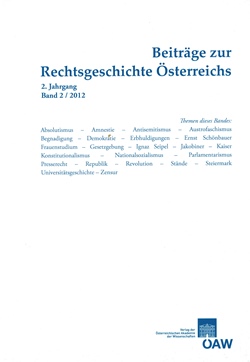
Beiträge zur Rechtsgeschichte Österreichs 2 / 2012, pp. 237-249, 2012/12/20

In the German press published in Opava, Silesia, at the beginning of the 20th century there was outlined the mostcomprehensive program of excluding Jews from the protection of otherwise commonly binding law. What preventedits popularization was the intervention of the Austrian public prosecutor as the censoring agency. The programanticipated the provisions of the later Nazi Nuremberg laws. In the Austrian monarchy, the propaganda of racialanti-Semitism that was launched by the German nationalistic press and alluded to an alleged anthropological inferiorityof the Jews aimed at fostering a universal disdain toward them and promoting an acceptance of their legalexclusion. The Austrian prosecuting agency reacted sharply to these attempts and confiscated each issue of Germannationalistic press products in which references to the ideology of racial anti-Semitism and appeals to the legal exclusionof the Jews were detectable.The type of anti-Semitism that dominated in Galicia and in the Czech area was different in its nature. It had economic,cultural and religious backgrounds. It tended to evoke animosity and hostility toward Jews in order to separatethem from the Christian part of society. In Galicia, attempts to resort to administrative and legal measuresagainst the Jews and reduce them to citizens of an inferior category were rare. In the anti-Semitic texts that werecensored by the Cracow or Lvov prosecuting agencies there were no open demands for the deprivation of the Jews oftheir public and civic rights as “a suitable method of getting rid of the pernicious influence of the Jews on Polishsociety”. In Galicia, it was thanks to the role played in education by the conservative and catholic class, which ruledthe province, that the question of abolishing equal rights for Jews did not become part of the public or political discourse.